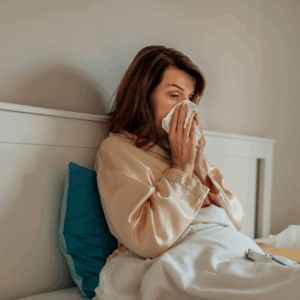Learn how to get a flu vaccine as an add-on, view frequently asked questions and more.
During this COVID-19 pandemic, let us help you navigate through the flu season by adding a flu shot to your services. We’ll help you learn how to get one and stay updated on the latest guidelines and recommendations.
Schedule your appointment today!Frequently Asked Questions
How does the flu vaccine work?
Flu vaccines cause the antibodies in the body to form, usually two weeks after vaccination. Due to these developed antibodies, they provide protection against infection for viruses that are used to make the vaccine (in this case flu).
How effective is the flu vaccine?
The flu vaccine has shown to be 40-60 percent effective in reducing the risk of contracting the flu, according to the Center of Disease Control and Prevention (CDC).
Who should get the flu vaccine?
6 months and older. It is especially important this year for those of 65 years of age and older, who account for most hospitalizations and deaths from flu and from COVID-19. Please make plans to get vaccinated early in fall, before flu season begins. The CDC recommends that people get a flu vaccine by the end of October.
Why do I need to get vaccinated every year?
Flu vaccines are needed every year, because the flu virus changes each year by evolving and previous vaccines may no longer be as effective. Every year the vaccine needs to be updated, so it’s important to get the shot annually. It’s for optimal protection against the virus.
What are some symptoms of the flu?
Flu symptoms may include:
fever* or feeling feverish/chills
cough
sore throat
runny or stuffy nose
muscle or body aches
headaches
fatigue (tiredness)
Some people may have vomiting and diarrhea, though this is more common in children than adults
Can a flu vaccine give me flu?
No, a flu vaccine cannot give you the flu. Flu vaccines are performed with a needle (flu shots) that are made in two ways: flu vaccine viruses that have been inactivated (“killed”) and cannot infect you, or with proteins from a flu vaccine instead of a virus.
Can I get the flu vaccine when I’m sick?
You should not get the flu vaccine if you are experiencing a moderate to severe illness with a fever. Talk to your primary doctor if you have any questions.
Will having the flu make me more susceptible to COVID-19?
Although there is no clinical evidence that suggests having the flu increases your chances of getting COVID-19, it is important to note that it is possible to have both at the same time.
Does a flu vaccine increase your risk of getting COVID-19?
There is no evidence that getting a flu vaccine increases your risk of getting sick from a coronavirus, like the one that causes COVID-19.
We’ll help you navigate this year’s flu season. Appointments available now.
$35 AS AN ADD-ON, OR $40 ALONE.
Source:
https://www.cdc.gov/flu/prevent/keyfacts.htm








